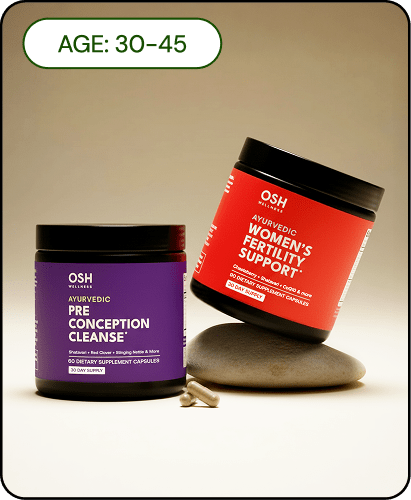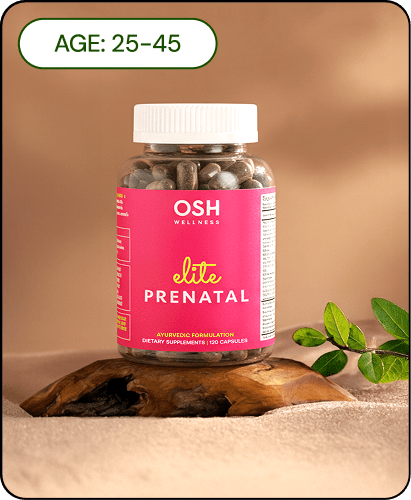Table of contents
A Brief Background On PCOS

Polycystic ovary syndrome (PCOS) is a complex endocrine disorder affecting women during their reproductive years. It is characterized by an imbalance in sex hormones, leading to a variety of symptoms, such as irregular periods, infertility, acne, and excess hair growth. PCOS impacts approximately 8% to 18% of women, depending on diagnostic criteria, including the NIH, Rotterdam, and AES standards. While it is primarily recognized as a reproductive issue, it has wide-ranging effects on metabolic and psychological health, contributing to insulin resistance, obesity, and a higher risk for cardiovascular diseases and type 2 diabetes[1][2].
Recent studies have advanced our understanding of PCOS, highlighting key contributors like insulin resistance, genetic factors, and hormonal imbalances, particularly an abnormal ratio of luteinizing hormone (LH) to follicle-stimulating hormone (FSH). This disorder can significantly affect a woman’s quality of life, making early diagnosis and tailored treatment crucial[3][1].
What Role Does PCOS Play In Fertility?
PCOS is one of the leading causes of infertility, primarily due to ovulatory dysfunction. Women with PCOS often experience anovulation (lack of ovulation) or oligo-ovulation (infrequent ovulation), making conception challenging. The mechanisms at play include:
Hormonal Imbalances: Elevated levels of LH and androgens (male hormones) interfere with normal follicular development, preventing eggs from maturing properly and hindering ovulation[4][5].
Compromised Oocyte Quality: Research suggests that women with PCOS may have lower oocyte (egg) quality, which can impair fertilization and early embryonic development[4].
Insulin Resistance: A common feature of PCOS, insulin resistance exacerbates high androgen levels and further suppresses ovulation, complicating efforts to conceive[6].
Systematic reviews indicate that 7–10% of infertile women have PCOS[6]. Fortunately, many women can regain fertility through lifestyle changes and medical treatments. Weight loss, dietary adjustments, and regular physical activity can often restore ovulatory cycles[5].
Potential Pregnancy Risks with PCOS
Women with PCOS face higher risks for pregnancy complications, including:
Miscarriage : The risk of miscarriage increases by 49–53% in women with PCOS, regardless of factors like maternal age or body mass index (BMI)[7].
Gestational Diabetes (GDM) : PCOS significantly raises the risk of gestational diabetes during pregnancy, more than doubling the odds compared to the general population[8].
Preeclampsia and Hypertension : Women with PCOS are at a higher risk for preeclampsia (RR: 2.8) and pregnancy-induced hypertension (PIH) (RR: 2.5)[8].
Preterm Birth and Cesarean Deliveries : Rates of preterm birth and cesarean section are elevated in women with PCOS[8].
Neonatal Complications : Risks for conditions such as hypoglycemia and even perinatal death are higher in babies born to mothers with PCOS[8].
Due to these risks, preconception counseling and close monitoring during pregnancy are recommended to ensure early intervention and optimal outcomes[7].
Boosting Your Chances of Pregnancy with PCOS

It’s normal for women with PCOS to worry about whether they will be able to get pregnant. As soon as you plan for a baby, you should voice your concerns to your doctor. They’ll provide you with information and discuss your options with you. Some suggestions they may have include:
Achieve a Healthy Lifestyle
For women with PCOS, adopting a healthy lifestyle is critical in improving fertility, metabolic health, and psychological well-being. Here are some lifestyle interventions that can help:
Weight Management : Even a modest weight loss of 5–10% can help regulate menstrual cycles and improve fertility in many women with PCOS[6][9].
Dietary Changes : A diet rich in low glycemic index foods, fiber, omega-3 fatty acids, and antioxidants can enhance insulin sensitivity and hormonal balance. The Mediterranean diet, for example, has been shown to improve metabolic and reproductive outcomes in PCOS women[9][11].
Physical Activity : Regular aerobic and resistance exercise reduces insulin resistance, supports weight management, and improves reproductive health[9][10].
Behavioral Support : Incorporating goal-setting, self-monitoring, and education into lifestyle changes can enhance adherence and improve overall outcomes[9][10].

Return Your Body to Balance
Hormone balance is essential for pregnancy. Some women may be able to regulate their hormones with less invasive medications and treatments. Natural methods include making lifestyle changes and adding natural supplements to your routine.
Lowering insulin might help with hormone levels, mainly because those with PCOS often have insulin resistance, directly affecting ovulation. One study reported that caloric intake timing could help to lower insulin levels. A diet that includes most of your calorie intake at breakfast might decrease your testosterone levels and improve insulin levels, said researchers.
Natural substances can also help balance your body’s hormones. Shatavari is a traditional menstrual regulator and uterine tonic. Chasteberry extract helps to extend a woman’s luteal phase and supports progesterone production. Gokshura is effective in boosting FSH as well as libido. Of course, minerals like Chromium and Magnesium are beneficial too, helping to regulate insulin levels.
Adding a supplement to your diet can be an effective way to support your fertility.








